ANSI c on OSX 10.13.6
Apple LLVM version 9.1.0 (clang-902.0.39.2)
Target: x86_64-apple-darwin17.7.0
Thread model: posix
I'm learning c
This is a function that manually (character-by-character) adds two character strings representing large numbers (that exceed the unsigned long long or double size).
It functions fine with any two strings 14 or less characters long, but segmentation fault 11 with any strings greater than 14 chars.
Changing the string's memory allocation method seems to have no effect (I.e. from
char[15] addend1; // not a ptr
to
char *addend1 = (char *) malloc(sizeof(char) * (16) ); // pointer
One things that's curious, is that it seems to segfault on the ...
for (int j = maxlength - 1 ; j >= 0; j--)
... prior to accessing either of addend1 or addend2, but I'm not able to find an error there or change it to prevent the segfault.
Am I misreading where the error arises, or could it be related to the for loop?
Successful run (less than 15 chars)
maxlength = 14
char *sum = (char *) malloc(sizeof(char) * (maxlength + 1) ) ... DONE
for (int i = 0; i < (maxlength); i++) { sum[i] = '0'; } ... DONE
Start adding individual ints from end (right side) ...
13 ...12 ...11 ...10 ...9 ...8 ...7 ...6 ...5 ...4 ...3 ...2 ...1 ...0 ...main.sum = 28147497671064
UNSuccessful run (15 chars)
maxlength = 15
char *sum = (char *) malloc(sizeof(char) * (maxlength + 1) ) ... DONE
for (int i = 0; i < (maxlength); i++) { sum[i] = '0'; } ... DONE
Start adding individual ints from end (right side) ...
Segmentation fault: 11
MAIN.c
#include <stdio.h>
#include <stdlib.h>
#include "../../c-library/include/addViaStrings.h"
int main(void) {
// s[0] = 72; s[1] = 101; s[2] = 108; s[3] = 108; s[4] = 111; s[5] = 32; s[6] = 87; s[7] = 111; s[8] = 114; s[9] = 108; s[10] = 100; s[11] = 0;
// WORKS
// char s1[] = "14073748835532";
// char s2[] = "14073748835532";
// FAILS
char s1[] = "140737488355328";
char s2[] = "140737488355328";
char *sum = addNumericStrings(&s1, &s2);
printf("main.sum = %s\n", sum);
}
addViaStrings.h
#include <stdio.h>
#include <stdlib.h>
#include <stdbool.h>
char* addNumericStrings(char *s1, char *s2);
char leftPad(char *result, char *s, int maxlength);
int findMaxLength(char *s1, char *s2);
char* addNumericStrings(char *s1, char *s2){
// Find the length of the greater of the two
int maxlength = findMaxLength(s1, s2);
printf("maxlength = %d\n", maxlength); //333
///////////////////////////////////////////////
// Using malloc instead of char[maxlength] seems to have NO EFFECT on the issue
// char addend1[maxlength]; // not a pointer
char *addend1 = (char *) malloc(sizeof(char) * (maxlength + 1) );
addend1[maxlength + 1] = 0; // end flag
// char addend2[maxlength]; // not a pointer
char *addend2 = (char *) malloc(sizeof(char) * (maxlength + 1) );
addend2[maxlength + 1] = 0; // end flag
// Allocate sum pointer
printf("char *sum = (char *) malloc(sizeof(char) * (maxlength + 1) ) ... "); //333
char *sum = (char *) malloc(sizeof(char) * (maxlength + 1) );
printf("DONE\n"); //333
// General use vars
int a1, a2, total;
int carry = 0;
// Prepare the strings for manual addition. Pad the left with char 0s
leftPad(addend1, s1, maxlength);
leftPad(addend2, s2, maxlength);
// Buffer sum with zeros
sum[maxlength + 1] = 0; // end flag
printf("for (int i = 0; i < (maxlength); i++) { sum[i] = '0'; } ... "); //333
for (int i = 0; i < (maxlength); i++) { sum[i] = '0'; } // Fill w/ 0s
printf("DONE\n"); //333
// Run the manual addition
// Start adding individual ints from end (right side)
printf("Start adding individual ints from end (right side) ...\n"); //333
// maxlength -1 because(I think) the termination char takes 2 bytes
// If I use (maxlength) instead of (maxlength -1) I get a weird
// question mark char at the end of returnsum
for (int j = maxlength - 1 ; j >= 0; j--) {
///////////////////////////////////////////
// The segfault seems to happen BEFORE accessing addend1 or addend2
printf("%d ...", j); // 333 This DOES NOT print
///////////////////////////////////////////
a1 = addend1[j] - '0'; // Convert to int
a2 = addend2[j] - '0'; // Convert to int
total = (a1 + a2 + carry);
carry = 0;
if ( total >= 10){
carry += 1;
total -= 10;
}
sum[j + 1] = '0'+total; // convert to ascii value for numbers (adding 48)
}
sum[0] = '0' + carry; // add last carry to start of num always, even if 0
// Before returning, truncate leading zeros
char *returnsum = (char *) malloc(sizeof(char) * (strlen(sum) + 1) );
int sum_i = 0;
int returnsm_i = 0;
// bool truncate = true; // Find out why this wont compile
int truncate = 1; // true
while (1){
// if order is important here
if (sum[sum_i] == '\0') { break; } // we're done
if (sum[sum_i] == '0' && truncate == 1) { sum_i += 1; continue; } // 1 is true
// if a num, Stop truncating 0s but DO continue adding numbers
if (sum[sum_i] != '0') { truncate = 0; } // 0 is false
returnsum[returnsm_i] = sum[sum_i];
returnsm_i += 1;
sum_i += 1;
}
return returnsum;
}
char leftPad(char *result, char *s, int maxlength){
int slength = strlen(s);
// buffer with zeros, not '\0's
for (int i = (maxlength); i >= 0; i--){ result[i] = '0'; }
// right fill result with s
for (int j = 0; j <= slength; j++){
int index = ((maxlength - slength) + j);
result[index] = s[j];
}
result[maxlength + 1] = 0;
}
int findMaxLength(char *s1, char *s2){
// int length1 = findEndLength(s1);
// int length2 = findEndLength(s2);
int length1 = strlen(s1);
int length2 = strlen(s2);
int maxlength;
(length1 > length2) ? (maxlength = length1) : (maxlength = length2);
return maxlength;
}
